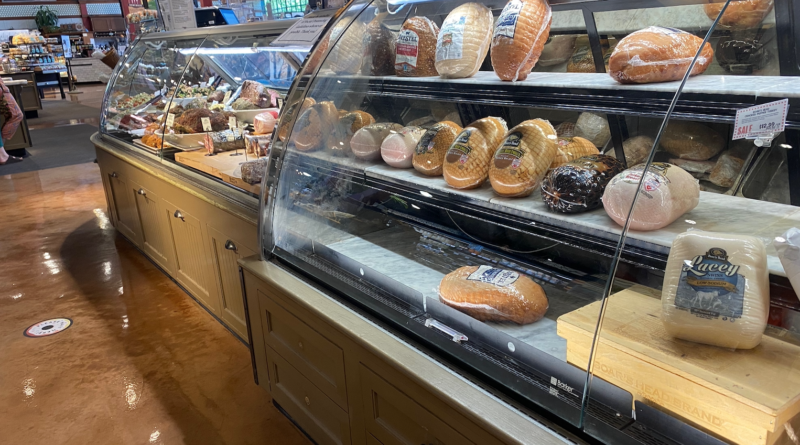Davis businesses manage meat shortage
PHOTO: The meat shelves at Nugget remain understocked as a result of the national meat shortage.
By Genna Olavarri,
BlueDevilHUB.com Staff–
Many Davis businesses are feeling the effects of the current national meat shortage. Due to the COVID-19 pandemic, some larger meat processing facilities across the country have experienced closures. The resulting deficit and increased meat prices can be combated by sourcing meat locally or eating less meat.
Stores such as the Davis Food Co-op that rely on locally sourced meat have been able to remain well-stocked and to yield their usual selection of cuts despite the shortage. “We have great local providers,” co-op manager Andrew Cordova said.
In contrast, Nugget Markets acquires the majority of their meats from out of the state. As a result, the store has struggled during the nationwide shortage.
“[It’s] hit or miss throughout the week,” meat manager Juan Ibarra said. “Certain items […] are unavailable to us”.
According to Ibarra, meat sales have actually risen, which also contributes to the store’s short supply. Especially in the beginning of shelter-in-place, people made efforts to stock up on foods, which included meats.
“People were crazy buying,” Ibarra said.
The demand for meat has remained high as people continue to cook at home more frequently instead of going out to restaurants. The low supply and high demand have caused meat prices at Nugget, among other stores, to rise. “[We] have to react to stay competitive as a business,” Ibarra said.
Restaurants in Davis have also faced the effects of the meat shortage.
According to Burgers and Brew employee Christopher Montenegro, the restaurant underwent around a 10 percent decrease in available meat towards the beginning of the shortage. “[But] it wasn’t much of a problem,” Montenegro said. With fewer customers due to quarantine, the shortage of meat presented less of an issue.
While some restaurants and grocery stores have contended with the negative effects of the shortage, the crisis has granted some benefits for local farms.
Jeremy Shepherd and his partner Kim Stanford run a sustainable farm in Winters and sell their products to customers at the Davis Farmers Market. Stanford reported that market sales have picked up due to the shortage of meat in some grocery stores.
With meat being more expensive and less readily available, it appears some people are looking to cheaper, local alternatives to store-bought meat.
Because Shepherd and Stanford maintain a small business and sell directly to their customers rather than through a third party, they are able to protect the integrity and sustainability of their products while keeping their prices down.
Eating less meat or going vegetarian could be another potentially healthier and more cost-effective alternative.
According to the U.S. Department of Health and Human Services’ dietary guidelines for Americans, consuming less processed meat can be associated with healthy eating patterns and lower risk for diseases such as cardiovascular disease and type two diabetes.
Davis High junior Georgia Sachs has been vegan for the past two years and just switched to being vegetarian at the beginning of quarantine. “If you don’t have to, why are you eating [meat]?” Sachs said.
On the other hand, people like sophomore Lily Wierzbicki cannot imagine a diet that excludes meat.
“I respect [vegetarians] because they care about animals,” Wierzbicki said. “[But] half of my food intake is meat.”
With higher meat prices, Wierzbicki and her family are willing to pay more for the product. “It’s always been expensive,” she said.


